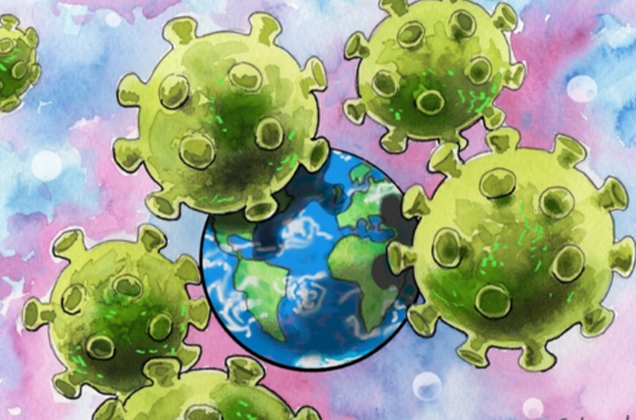23/09/2020
CDP Turkey compiled opinions shared by international academia on the link between the COVID-19 pandemic and climate change.

Once the disease Covid-19 caused by a novel coronavirus was declared a global pandemic by the World Health Organization on March 11, 2020, many opinions surfaced about the link between the pandemic and climate change.
Commenting on whether climate change played a part in the occurrence of the pandemic, Harvard University Center for Climate, Health and the Global Environment Director Dr. Aaron Bernstein says that there is no evidence suggesting that climate change triggered the proliferation of the novel coronavirus. However, says Bernstein, climate change alters the way we interact with other species on Earth, which may be significant for risk of infection.1 According to Bernstein, as the planet warms up, many aquatic and terrestrial species move towards the poles. This causes many species that would not normally interact to come into contact, which gives pathogens the chance to migrate to new species. Moreover, deforestation is the key cause of loss of habitat worldwide. Loss of habitat forces animals to migrate, come into contact with new species, and be introduced to new pathogens.
The other link between the virus is the reduction, albeit temporary, in greenhouse gas emissions in countries like China and Italy, which were the hardest-hit by the virus. Shorter working hours in the industry, closing down retail stores and changing habits all caused global emissions to drop. According to The Guardian's global environment editor Jonathan Watts, if this trend continues, it is possible this will lead to the first fall in global emissions since the 2008-09 financial crisis.2
Some experts believe that the novel coronavirus may have other positive outcomes in terms of climate change. According to climate activist Bill McKibben, if governments can learn lessons from the physical world and its risks, they may develop more radical, longer-term plans for fighting climate change.3 Similarly, Michael Lazarus, U.S. director at the Stockholm Environment Institute, believes that if there is a sense of social cooperation that emerges from this in response to a threat, that could be a very good sign for communities and leaders to come together. 4
Finally, there are many experts who argue that the novel coronavirus will have an adverse effect on climate change. For example, according to Stanford University professor Rob Jackson, says that the virus will hinder climate change action from corporations and countries despite the short-term drop in carbon emissions from the outbreak as governments delay or even cancel climate-friendly policies that require investments up front.5
The full article is available here.
1 https://www.hsph.harvard.edu/c-change/news/coronavirus-climate-change-and-the-environment/
2 https://www.theguardian.com/world/2020/mar/10/coronavirus-could-cause-fall-in-global-co2-emissions
4 https://insideclimatenews.org/news/10032020/coronavirus-climate-change-economy-emissions




